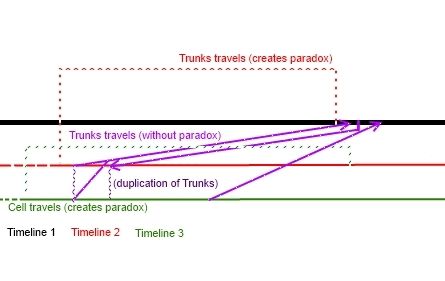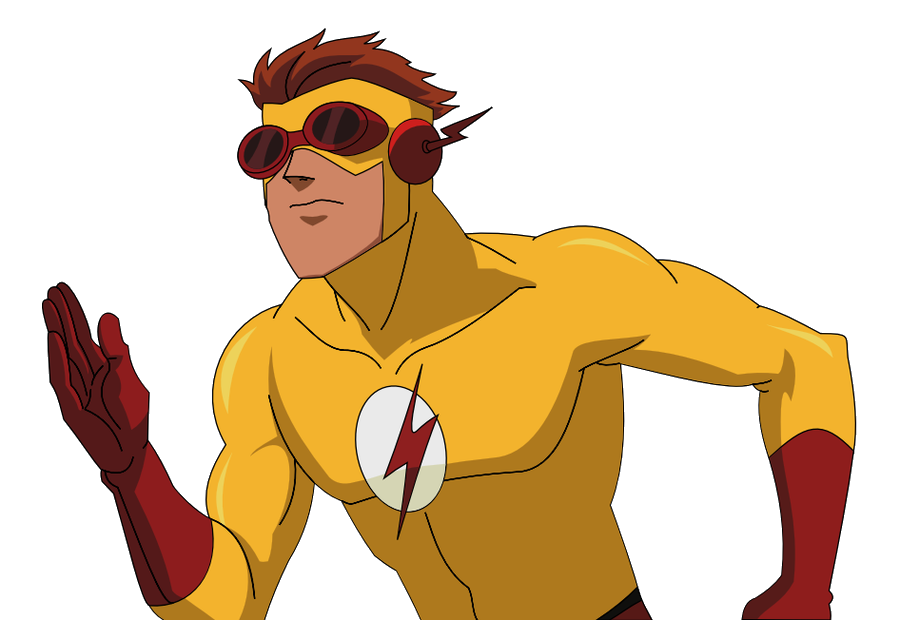However, recently, I've noticed that there's another way to make sense of the timeline and time travel business. But I'm not sure if it's any better than the old one. It has some advantages, but it also has some disadvantages.
So, I figured I would create this topic explaining my thought process on how this all works to see what you guys think, and also to discuss these themes if you are interested.
There's already other topics about timelines and time travel in the forum but I thought it would be relevant to create another topic since I'm interested in seeing which theory of mine is more agreeable with you guys. Hope that's ok.
Also, beware, this will be a fairly loooong post
So, for starters, I will begin to explain my old theory:
Theory 1
It all began with one single timeline.
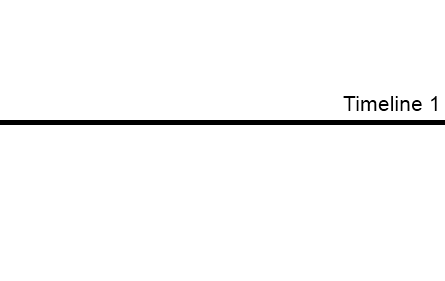
In this unaltered timeline, after Freeza and Cold are defeated by Goku, Goku falls ill and dies. Shortly after, the androids attack. And thus is born the world that Future Trunks knows.
In this world, of all the fighters only Gohan is left, as well as Trunks, but even Gohan eventually dies fighting the androids. Alone, no matter how much he tries, Trunks finds that he is not a match for the androids either.
What to do?
Enter Bulma and her amazing boo... er, brain. That's right, when muscles failed, Bulma and her intellect saved the day by creating a time machine (one would think that it would be easier to create a super-weapon capable of destroying the androids than a time machine but, hey, I won't argue with genius).
Bulma gives the time machine to Trunks and he uses it to travel back to the past.
This is where we first encounter the time travel mechanics in Dragon Ball, which we will have to analyze properly to make sense of them.
There are several theories in (science) fiction regarding what would happen in a time travel scenario where a time traveler changes the past. They range from the complete destruction of the universe (the fear of the Doc in Back to the Future), to the destruction of the old timeline, to the creating of parallel timelines.
Which is the case in Dragon Ball?
As we can see in the manga, the universe didn't end and Future Trunks and his own timeline (future) continued to exist since he returns to it. Therefore, it's clear that Dragon Ball adopted a parallel timelines approach to time travel. And thus, Trunks, with his time travel, creates a new timeline, changed from his original timeline. His own, original timeline remain, and a duplicate, with the changes introduced by Trunks is born.
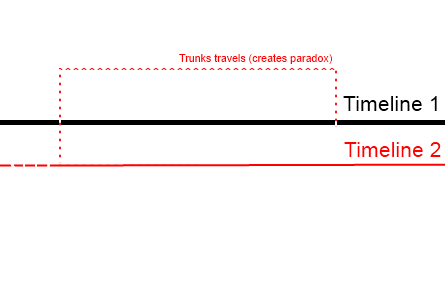
What are the differences in this timeline compared to the old? Trunks killed Freeza and Cold and gave Goku his medicine and that changed the timeline from that point on.
We also know that Trunks returned to his timeline after saving Goku. So, we can wonder, did that time travel create yet another timeline?
To answer this question, we have to dwell a little deeper on time travel mechanics.
As I've said, there's various theories in science fiction about what would happen. But why do these theories exist? What problem are they exactly answering?
They are answering to the unique problem caused by time travel: a paradox.
The problem can be described with the following: if a man travels to the past, and kills his past self, he is not only killing a person, he is killing the person that would grow to be him. But, if the person that was going to be him, is killed, then how can he exist? And if he doesn't exist, how can his past self have been killed by him? And if his past self couldn't have been killed, then he would eventually become his future self and would kill his young self. And if his young self was killed, then, once again, how does he exist?
This is a never ending logical problem, a paradox, that exists uniquely in a time travel scenario. And that's why those theories exist: to offer a logical solution to the problem.
Therefore the chosen solution applies to whenever this problem, a paradox emerges. By traveling to the past, Trunks created a paradox, which is why a new timeline emerged.
But did his journey back to his timeline create a paradox? I don't think so. He presumably traveled to a moment in time after he had traveled back, so, therefore, there wouldn't be any paradox.
And what about his journey back to the past? Here we have to consider carefully what happened.
If we pay attention, it's clear that Trunks, unlike with his first journey, didn't travel to the past of his own timeline. If he did, he would just travel back to a point in time where Goku had already died and just before everybody was about to get surprised by the androids, which was what happened in the past of his timeline, and another paradox would have been created alongside another timeline.
Instead, Trunks arrived in the timeline that he had created. What does this mean?
Imo, this means that the time machine is not only capable of time traveling, it's also able to travel to a point in time in the timelines previously created by the machine. That's how it can go back to that timeline and not to the past of the original timeline. And does this create a paradox? Imo, no, because, at this point, the timeline was already separate from the original timeline. These journeys are no more than journeys that don't create a paradox and thus no timeline is born from them.
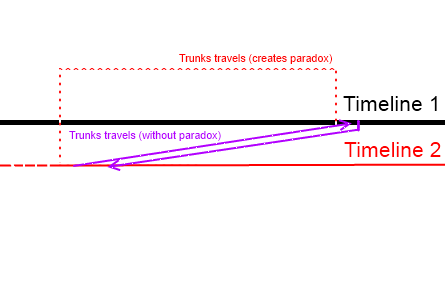
But, is this timeline 2 the timeline that we see in the manga? The main timeline?
As we see in the manga, the main timeline had a Future version of Cell that had time traveled. What does this mean?
Well, as we saw, Dragon Ball adopted a parallel timeline approach. Which means that every time a timeline is changed by a time traveler, there will be an original timeline and duplicate of that timeline with the changes introduced by the time traveler. But the main timeline, the timeline of the manga, has the intervention of both Trunks and Cell. What does it mean? Well it means that this timeline can't be the main timeline. This timeline only has one intervention, and there's no Cell intervention. This will become clearer in a few paragraphs. For now, let's continue with the analysis.
So, without the intervention of Cell, how would things play out? It's unknown. And being unknown, we have to to consider the possibilities and imagine. The gang either managed to beat the androids or they didn't. Let's assume that they did. What would happen?
Well, Trunks would then return home and get rid of the androids the same way that they managed to get rid of them in this timeline 2. And then what?
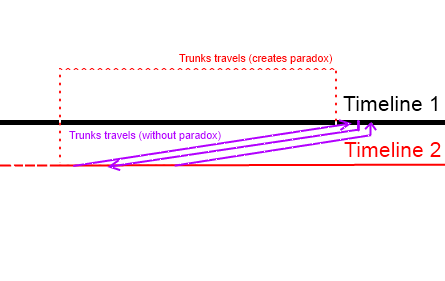
Enter Cell.
So far no one had heard of Cell. But now, after long years growing, Cell awakens in Future Trunks' timeline. Trunks never found out about him because he hadn't appeared in his timeline yet and the timeline 2 didn't have the intervention of Cell. And Cell doesn't find the androids because they had been defeated. Instead he finds Trunks. So, Trunks being surprised by Cell, what happens? Cell either defeats him or Trunks defeats him. Which one happened?
Well, so far, this scenario seems awfully similar to what Cell in the main timeline described... It seems to fit... What does it mean?
It means that the scenario we imagined is correct.
In all likelihood, the gang did manage to beat the androids (perhaps by managing to create a remote?) and Trunks returned home to his timeline.
Then Cell woke up and defeated Trunks. After defeating Trunks, Cell uses his time machine at random and the machine travels to the timeline it has created (timeline 2) but, this time, this time travels creates a paradox because Cell's intervention will change things and disturb the logical flow of events because Cell traveled far into the past and so, his journey, created a new parallel timeline.
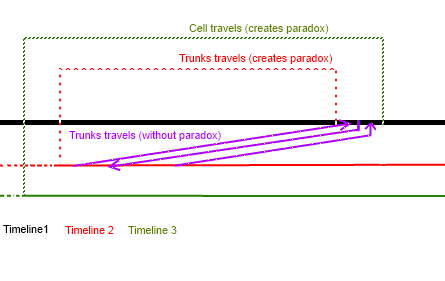
Timeline 3 is born.
And is this timeline the main timeline? It's a timeline with both the intervention of Trunks and Cell and their changes, so, yes. This is the main timeline, the timeline from the manga.
However, one important question arises here. And is perhaps the most complex regarding the time traveling mechanisms. The question is the following: in the timeline 3 we also have a Trunks arriving from the future to help the gang against the androids. But wasn't he in timeline 2? How can he be both in timeline 2 and 3? What is going on?
To answer this, we have to wonder on exactly happens when a timeline is duplicated. What happens? Well, like the term says, there's a duplication. Suddenly, there's two time lines, not one, and two earths, two universes, two Gokus, two Kamis, two everything.
But, this is not simply a physical duplication. A whole timeline was duplicated.
That means that not only a past but also also a future was duplicated. Timeline 3 has a past, which is not the past of Timeline 2. It's exactly the same in terms of event, but it's not the same one. To put it simply, in both pasts there's a Bardock who does exactly the same, but there's one for each timelines (two Bardocks).
And what about the future? Does the same thing happen?
The answer is yes. Everything that was going to happen, happens. The only difference is that the new timeline will have the added differences introduced by the time travelers on top of everything that was going to happen, influencing it.
What does it all mean? It means that Trunks that existed in Timeline 2 is also duplicated in Timeline 3. Just like every other event and character from that timeline was duplicated from timeline 2, he is also duplicated. Just like them, he appears out of the paradox. He is no exception.
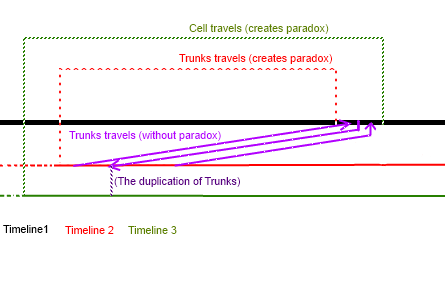
Confusing? I admit it's a bit, but I honestly think it makes complete sense in light of what happens in the manga.
So, moving on, now we have timeline 3, the main timeline, with the presence of Trunks there explained.
The events in this timeline we are all well aware. Cell is defeated by Gohan, and Trunks returns home.
It's interesting to note that this Trunks is the one duplicated. So, we could wonder, could he return to timeline 1? Well, his time machine is duplicated and is exactly the same. That means that it can time travel but it can also return to the timelines it created and to the original timeline, like it had a set of coordinates. So, imo, there is no reason why he shouldn't be able to and that's indeed what happens, when we see him returning to the original timeline.
However, this return disrupts the logical flow of events since he returns to a point in time before Cell, who they had killed, had time traveled. Therefore, this timeline creates a paradox, and a new timeline is born: timeline 4.
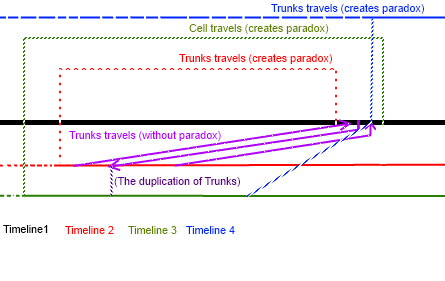
We see the events of this timeline. Trunks, now being much stronger, defeats the androids and Cell easily.
Also, you can wonder, isn't there supposed to be another Trunks in this timeline? A duplicate from the one that returned from Timeline 2, since timeline will be a replica of Timeline 1? And you would be correct. Indeed, there should be another Trunks here. However, there's an unique problem here: they both had the same exact machine and they both probably returned to the same exact location and time. So... What would happen? I can only see two possibilities, since they can't both exist in the same location at the same time: they would either both be destroyed or one would override the other. Given what happens in the manga, where there is only one Trunks, it seems that the duplicate was simply overwritten.
This was my original theory. Here are the advantages and disadvantages of it:
- Advantages:
It closely follows the manga with the minimum amount of assumptions regarding unseen events that I could come up with. The assumptions and theories are mainly about the mechanics of how it works, not actual events in the manga.
- Disadvantages:
It requires of us to disregard the fact that Cell stated that Freeza and Cold were killed by Trunks in his timeline instead of Goku. That is treated as a plothole, just like when Trunks tells Goku that the androids were named #19 and #20, instead of #17 and #18 like he does later.
So, like I said, for a long time, this was my theory. However, recently I came up with this one:
Theory 2
Everything about the mechanisms of time travel and timelines works the same in this theory. There's no change regarding that.
So, at first we have one timeline.

Then the androids appear, and eventually Trunks time travels, which creates timeline 2 (following the explained mechanisms).

We also have the travels of Trunks, which don't create a paradox.

And once again, we are faced with the question: what happens in this timeline, without Cell's intervention? And this is where the theory is different.
On the first theory, as mentioned, I reached the conclusion that they defeated the androids somehow, going by what Cell eventually said. But what if something else happened?
What if they didn't manage to beat the androids? What if in this timeline, they still fail to stop the androids, and the future of the timeline is strikingly similar to the future of timeline 1? After all, a lot of things could have happened without the interference of Cell.
We have to go on some assumptions here regarding the events, but lets do it and see where it takes us.
What if they lost?
What if Piccolo, Goku, Vegeta and Future Trunks (and perhaps the others, except present/baby Trunks) died fighting off #17, #18 and #16, and of the androids only #16 dies, while the other two androids survive?
It's certainly possible... #16 was very powerful, and Piccolo, the strongest one, might not even win against #17 alone as we saw in the manga. If they faced off against the androids or the androids forced them to fight before they went to ROSAT, this scenario could have happened, and the fight might even have happened in the look-out if the androids went to look for them there (for example after defeating Piccolo and realizing that Kami had something to do with Piccolo's power, and thus deciding to look for Goku there, before they went into the ROSAT, and the ROSAT and the temple being destroyed in the fight).
So, let's assume this scenario happens. What do we get? Well, we get a scenario close to the one on Timeline 1. #17 and #18 would still be alive and even Future Trunks would have died. Only baby Trunks would be left.
And after some years had gone by?
Well, there's no reason to assume that after a while the androids wouldn't be as bad as the ones in the original timeline out of boredom, so the world would probably be in ruins, pretty much like the original timeline. Bulma would have known about the time machine and if Trunks' time machine had been destroyed with him (he kept it in his pocket) she would have to build one from scratch. After some years she would have done it, just like the one from the original timeline had done.
So, suddenly, the scenario becomes even closer to the original timeline. Extremely close in fact. However, there's some differences. This Bulma would know more about the androids than the bulma in the original timeline, and she also would know that time travel is not a guarantee that everything will work out. So, it makes sense that she and Trunks would have tried other things.
What if, those others things, like, for example, attempting to build a remote to shut the androids down worked?
Then, they would have defeated the androids and they would still have a time machine.
But, despite having defeated the androids, they would still have a need to use the time machine since, despite being aware that it wouldn't change much for them, they could create a timeline where their friends were alive and had defeated the androids without a problem.
So, let's imagine that they plan to use the time machine to create that timeline, and even set the timeline to a time even significantly before Freeza and Cold had arrived, so that their friends have even more warning (better safe than sorry).
Enter Cell.
Finally awake, he doesn't find the androids, and he kills Trunks (who wasn't very powerful in this timeline), and he time travels creating timeline 3.
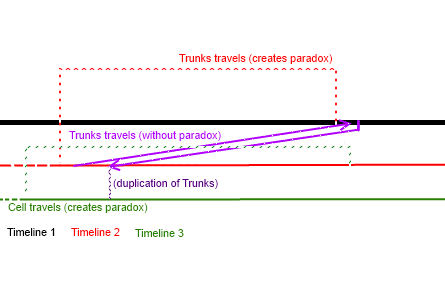
As you can see, the difference in this theory is that Cell is not from Future Trunks' timeline and the Trunks he kills is not Future Trunks. He's from Timeline 2, that ended up being pretty similar to timeline 1 and where Trunks also ended up very similar to Future Trunks.
This fits with what Cell tells us and explains why Trunks was the one that killed Freeza and Cold in his timeline. It's no longer a plothole, it also makes sense and is explained since Future Trunks killed Freeza and Cold in Timeline 2, indeed.
What Cell told us of his timeline is very little so it can easily mean either the original timeline or one similar to it. In this case, it would be Timeline 2, which ended up being similar to the original by chance.
As for timeline 3, it's the main timeline, just like it was explained in the first theory. Everything happens like in the manga. Cell never gets to grow up because he is killed in Cell's lab and Future Trunks is there because he is duplicated from timeline 2 like I explained in theory 1, and the adult Cell is defeated by Gohan.
Then, Future Trunks, travels back to the original timeline and now, since Cell wasn't the one from his timeline, there is no paradox. He simply arrives at timeline 1 and kills the androids and Cell from that timeline with his power.
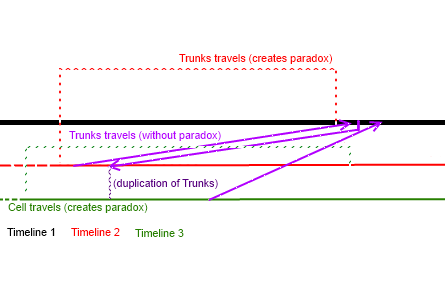
This was my new theory. These are the advantages and disadvantages:
Advantages: it explains why Cell said it was Trunks who killed Freeza, and it might even offer a more plausible explanation for why the time machine was set to such an early date. Thus, it contains no plotholes that I can see. Also, it allows the theory to be less complex because it only requires 3 timelines.
Disadvantages: it requires more assumptions regarding events in timeline 2. I don't think they are stretch but it definitely requires more than my first theory.
Conclusion: I'm not sure which one I prefer, but right now I'm more inclined towards the second one. What do you guys think? Thanks for the patience in reading
Btw, if anyone else has come up with the same theories, I assure you I'm not stealing credit, I just must have missed it
EDIT:
Victorious mentioned something that I forgot to explain. His question was the following:
My answer is the following:Victorious wrote:Lets look at your second theory. You think Future Trunks created Cell's timeline, and Cell created the main timeline? How do you explain the multiple times Future Trunks travels back and forth between the main timeline and his timeline, which according to you is the original? My question is in the main timeline, which for you is timeline 3, when Future Trunks kills Freeza and gives Goku the medicine where does he go? He must go back to timeline 1. But if he's just a duplicate then he'd be going back to the same timeline that the original Future Trunks who killed Freeza in Cell's timeline came from and travelled back and forth to, right? Meaning you'd get two adult Trunks in timeline 1. Which definitely never happened.
The situation is covered by the way I described how the mechanics work, especially regarding the creation of timeline 4 on the first theory. And it happens in both theories, it's not just an issue of the second theory.
Let's analyze it step by step.
Like I said, Cell creates Timeline 3.
This causes a duplication of Timeline 2, with the added changes brought on by Cell.
Following what I explained about the duplication, this also duplicates Future Trunks. So, Future Trunks appears on this Timeline and, for a brief period, he goes away. Where does he go?
As explained, his time machine can freely go back to the original timeline (as well as the timelines it created) and the machine that this duplicate Trunks has is exactly the same as the one in Timeline 2 has.
Also, so far, this Trunks is exactly the same as Trunks in Timeline 2 because Cell hasn't influenced anything yet.
So, when he goes back, he goes back to timeline 1.
And there is the heart of the issue. This Trunks, because he is exactly the same as Future Trunks, goes back to exactly the same point in time and location that Future Trunks also goes to when he returns after saving Goku.
It's the same kind of situation as when, in theory 1, when Timeline 4 is created, Trunks returns after Cell is defeated to the same point in Timeline 1 where another Trunks also returns.
At the time, I said that I could only think of two possibilities, since they can't occupy both the same place at the same time. They would either both die, or one would overwrite the other.
Imo, in theory 1, one overwrote the other and created a paradox and timeline 4.
This situation is the same in that regard so, Imo, one Trunks also overwrites the other in that situation.
However, now we have to wonder, does this create a paradox like it did regarding the creation of timeline 4?
Imo, apparently no, because, unlike the situation in timeline 4, both Trunks are exactly the same, in mind, body, and knowledge.
What created the paradox in timeline 4 was the fact that one Trunks was different and that would change the logical flow of events. But in this case, both Trunks will do exactly the same because they are exactly the same. Thus, one overwrites the other but there is no paradox, and no new timeline.
However, we can also wonder, now that there has been this overwriting, the remaining Trunks travels back to timeline 2 or to timeline 3?
It's on this point that there might be some justification for a paradox.
If Trunks went to Timeline 2, he would continue to overwrite the other Future Trunks and nothing would change.
But if he went to Timeline 3, he would overwrite the other Trunks there, but the situation would cause Future Trunks to not appear a second time on Timeline 2 since that Trunks wasn't a duplication. Causing a paradox.
So, if the situation is the last one described, there could be justification for a paradox to be created when that Trunks travels to Timeline 1, and a new Timeline.
How do we know which situation is true?
Well, we will have to take a very close look at how the machine works.
As it was said, the machine is capable of going back to its original timeline. That means that it can identify it, like with a set of coordinates in the space-time continuum or something (ask Dr Who for more details).
And it can also go back to a timeline it has created.
However, when it's a duplicated time machince that tries to go back to a timeline it (thinks) created, does it go back to the duplicated timeline thinking that that's the one it created (timeline 3) or does it go to the actual timeline that the original time machine created (timeline 2)?
I think... that both are possible. It really just depends on how exactly the machine works. If, for example, it follows something like coordinates, which are set in the machine just before it creates the Timeline, then the duplicate would go back to the timeline created by the original time machine. If it sets the coordinates after arriving, then it would go to the duplicated timeline.
Either is possible and I don't think any is more likely than the other. For simplicity's sake I'm going to assume that it goes back to the timeline created by the original because it duplicates the coordinates.
That means that Trunks continues to overwrite the one in Timeline 2, and that in Timeline 3, the one that appears just before the androids is a duplicate (that wasn't overwritten).
However, if we follow this assumption, this means that Trunks won't be able to get back to Timeline 3 after leaving it. Which is sad but it also explains why we never saw him again
In short, here's how it looks in the charts:
Theory 1:
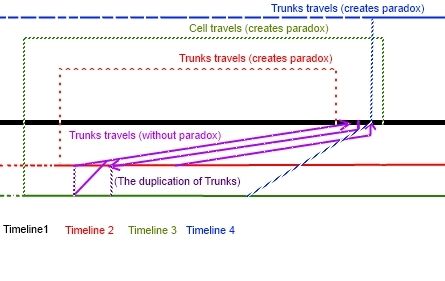
Theory 2:
